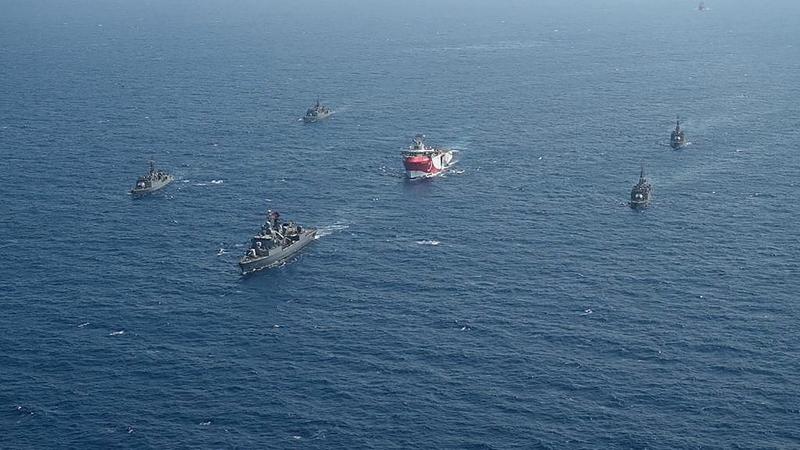 This handout photograph released by the Turkish Defence Ministry on Aug 12, 2020, shows Turkish seismic research vessel 'Oruc Reis' (center) as it is escorted by Turkish Naval ships in the Mediterranean Sea, off Antalya on Aug 10, 2020. (TURKISH DEFENCE MINISTRY / AFP)
This handout photograph released by the Turkish Defence Ministry on Aug 12, 2020, shows Turkish seismic research vessel 'Oruc Reis' (center) as it is escorted by Turkish Naval ships in the Mediterranean Sea, off Antalya on Aug 10, 2020. (TURKISH DEFENCE MINISTRY / AFP)
Tensions have escalated between Greece and Turkey over exploration of potentially lucrative offshore energy reserves in the eastern Mediterranean.
Turkey's President Recep Tayyip Erdogan accused Greece of "banditry "and vowed to continue the exploration despite mounting pressure from the EU
Pressure has been rising in the region since last week, when Turkey's President Recep Tayyip Erdogan sent a seismic research vessel into waters claimed by Turkey and Greece under separate maritime agreements.
The Turkish Navy is accompanying the Oruc Reis, and one of its ships was involved in an accidental collision on Wednesday with a Greek ship that was on joint exercises with the French military in the same area.
Erdogan accused Turkey's Mediterranean neighbors of "banditry "and vowed to continue the exploration despite mounting pressure from the European Union.
ALSO READ: Greek and Turkish warships in 'mini collision'
France sent warships and fighter jets to the Greek island of Crete last week in a show of strength with Greece after Athens stepped up calls for Turkey to stop the "illegal "activities.
Both Turkey and Greece have claimed the area as their sovereign waters under bilateral maritime deals that they have struck with Libya and Egypt, respectively.
The EU and the United States have thrown their support behind Greece and Cyprus, which accuse Turkey of incursions into their waters.
Several countries, including Greece and France, are pushing the bloc to impose sanctions on Turkey, which would hit its already weakened economy hard. Both Greece and Turkey are NATO members.
Long-contested waters
It is the closest that Greece and Turkey have come to outright conflict in the long-contested waters since 1996, when they came to the brink of war over the ownership of some uninhabited islets in the Aegean Sea.
Foreign ministers of EU members held an extraordinary meeting to discuss the crisis last week, and Angela Merkel, the German chancellor, has been on the phone to both Erdogan and Kyriakos Mitsotakis, the Greek prime minister, in an effort to de-escalate the row.
The EU urged an "immediate de-escalation".
In response, Erdogan said: "We will never bow down to banditry on our continental shelf. We will not back down to the language of sanctions and threats," he told a meeting of his ruling AK Party.
"The Oruc Reis will continue its activities until Aug 23. In this period we will not hesitate to respond to the slightest harassment of our ship," Erdogan added.
READ MORE: Greece, France 'hold joint drills' amid tensions with Turkey
Mevlut Cavusoglu, the Turkish foreign minister, met his US counterpart, Mike Pompeo, in the Dominican Republic last week for what the US secretary of state referred to as a "timely discussion...on the urgent need to reduce tensions in the eastern Mediterranean".
Erdogan previously said the only solution in the Mediterranean was dialogue and that his country was not chasing adventure.
"If we act with common sense and reason, we can find a win-win solution that meets everyone's interests," he said.
jonathan@mail.chinadailyuk.com


